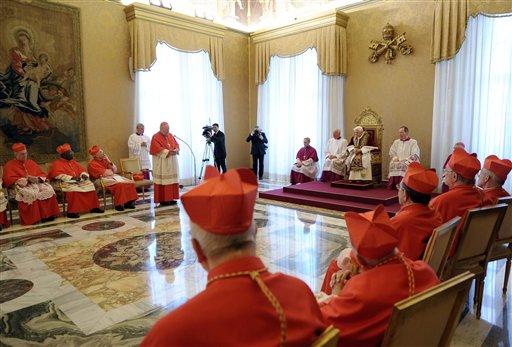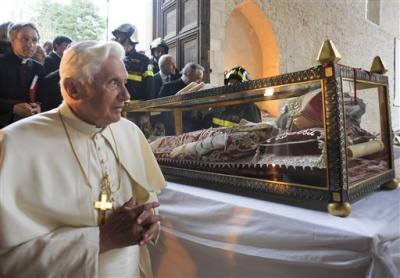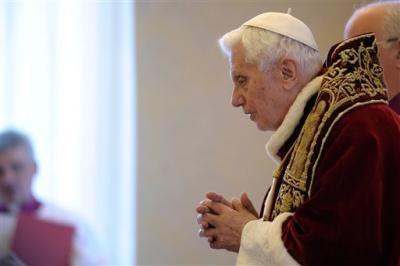Southern California Catholics Make Papal Wish List
By Barbara Jones
At churches, schools, offices and across social media, Pope Benedict XVI's historic announcement that he's resigning triggered a wave of surprise, a flurry of tributes, and speculation about how the Catholic Church will evolve under his successor. Worshippers expressed astonishment at the news they'd heard when they awakened for morning Mass, and priests quickly tucked a reference to Pope Benedict into their sermons. Leaders at the Los Angeles Archdiocese, the nation's largest, scrambled to react to the pope's statement that he will step down Feb. 28 because of failing health. Archbishop Jose Gomez quickly posted a statement on his Facebook page, expressing affection for the 85-year-old pope and describing him as "one of the wisest persons in our world today." Cardinal Roger Mahony - who was part of the 2005 conclave that elected Benedict as pope - blogged his admiration for the pontiff's teachings. "His homilies and addresses were so amazing because he was not speaking about Jesus Christ as a topic, but he was speaking about Jesus from a deep and intimate knowledge of Jesus himself," Mahony wrote on his blog. Mahony was publicly rebuked for covering up the sex-abuse scandal in Los Angeles, but retains his full powers as a prince of the church. He said he's looking forward to traveling to the Vatican next month to help choose the next pontiff. Gerald Barnes, bishop of the Diocese of San Bernardino, said Pope Benedict re-established the "essential values of the Catholic faith - love hope and charity." And he called on the College of Cardinals to "seek a continuity of inspired leadership" when they convene in secret to elect the next pope. In fact, Vatican observers noted that Pope Benedict appointed 67 of the 118 cardinals who will vote on his successor, so they likely share many of his views on thorny issues like contraception, gay marriage and the role of women in the church. Mahony and the remaining cardinals were chosen by the former pontiff, John Paul II, who shared a similar theology with Benedict. The next pope, Vatican observers say, will have to figure out how to create a sense of unity among the world's 1.2 billion Catholics at a time when demographic and cultural shifts have reshaped the church. "The average Catholic today is female, Filipino or Brazilian, poor and a young mother with less than a sixth-grade education," said Juan Martinez, associate provost for diversity and international programs at Fuller Theological Seminary in Pasadena. "These faithful Catholics are looking to the church for economic justice, support of family structure ... and how God participates in the world." Dorian Llywelyn, director of Catholic Studies at the private Loyola Marymount University in West Los Angeles, said the shift in the demographic heart of the church from the U.S. and Europe to Africa and South America could play a significant role in the selection process. Already, Cardinals Francis Arinze of Nigeria and Peter Turkson of Ghana have emerged as potential successors, along with a handful of favorites from Europe and North America. "You have voices in numbers, but they may not be voices the West wants to hear so the biggest challenge is going to be unity," said Llywelyn, who was ordained in Wales in 1990. "There's also the issue, locally and in the Western world, of moral credibility. The sex-abuse scandal has tarnished the church. There are concerns about social justice and immigration. "There's a thought that, if you can't get your own house in order, who is going to listen to you?" he said. The Rev. Thomas Reese, a senior fellow at the Woodstock Theological Center at Georgetown University, noted that 37 of the cardinals come from European diocese, making them the most substantial voting block. "Each will look at the candidates and will want to support one that reflects his own values and vision of the church," Reese said. "He's looking for someone he connects with, who listens to him and he feels comfortable talking to." At the same time, Reese said, the cardinals will be looking for a pope who can communicate effectively on a world stage. "He needs to communicate the Gospel in a way that is understandable and attractive to people," Reese said. "It's not about the pope. It's about Jesus and his message that his Father loves the people of the world." Jennifer Hughes, an associate professor of history at the University of California, Riverside, concurred that the desires of Catholics in the U.S. may not align with those in the rest of the world. "The American church is in crisis over the clergy sexual abuse issue and over issues of birth control," she said. "I think American Catholics would very much like to see a more progressive leadership out of Rome - like addressing the significant sexual abuse crisis, issues of birth control and the place of women in the church." But some Catholics said Monday they supported Pope Benedict's leadership on controversial issues and hoped his successor would uphold his legacy. "He tried to bring back more traditional aspects of the church, rather than all the secularism that has crept into just about everything," said Geri Buttke, a longtime parishioner at St. Mel Catholic Church in Woodland Hills. The next pope will have to "stand strong" as he faces challenges in what is a growing secular environment, said Andrea Stammereich, a parishioner at Holy Trinity Church in San Pedro. "I love (this) pope," she said. "I love his adherence to our doctrine and his no-nonsense approach." Her husband, John, the grand knight of the Knights of Columbus at Holy Trinity, credited Benedict with focusing on priorities such as the sanctity of life and service to the poor. But he said it is important that a pope be young and healthy enough to deal with issues like child sex abuse, which is still having an impact on local Catholics. Joelle Casteix, western regional director of the Survivors Network of those Abused by Priests, said her group was upset with Pope Benedict's resignation because they believe he will not be held accountable for the cover up of sex abuse by members of the clergy. And while she feels that the College of Cardinals will act to protect it own, she still holds out hope for victims of sex abuse. "I hope there will finally be that man of action who will punish wrongdoers and who will ensure that molesters are turned over to civil authorities. Patrick Bruner Reyes, 27, a doctoral student at Claremont School of Theology, said he believes Pope Benedict will be seen as a pontiff who pushed for orthodoxy and a continuation of a historical church. "I don't think history will look kindly ... not as kindly as it looks on Pope John Paul II. I think he was more progressive, traveled more, and was making changes in a world that was changing in a rapid pace. But he will go down as first pope to tweet. So you never know." Father Raymond Perez, pastor of Sts. Peter and Paul Catholic Church in Wilmington, doesn't foresee any significant changes in the church's positions on controversial issues like birth control and gay marriage. "I think the next few popes are going to want to continue what John Paul II and Benedict XVI did - the church has to move on to the future without losing track of where it came from." But Dennis Carlson, a deacon at Holy Trinity Catholic Church in San Pedro, however, said he hopes the church will become more inclusive, especially when it comes to women. "To me, this is an exciting time in the life of the church," Carlson said. "All we can do is maintain our faith and trust in Christ, he's the head of our church."
|
.
Any original material on these pages is copyright © BishopAccountability.org 2004. Reproduce freely with attribution.


